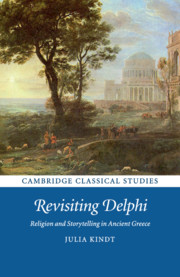Book contents
- Frontmatter
- Dedication
- Contents
- List of Illustration
- Acknowledgements
- List of Abbreviations
- 1 Introduction: Revisiting Delphi
- 2 Herodotus: Delphi, Oracles and Storytelling in the Histories
- 3 Euripides: Ironic Readings of Apollo and his Prophecies
- 4 Plato: Socrates, or Invoking the Oracle as a Witness
- 5 Pausanias: What's the Stuff of Divinity?
- 6 Athenaeus: Encountering the Divine in Word and Wood
- 7 Conclusion: Religion and Storytelling in Ancient Greece
- Appendix: Plutarch – A Philosophical Enquiry into an Enigmatic Divine Sign
- Bibliography
- Index
1 - Introduction: Revisiting Delphi
Published online by Cambridge University Press: 05 September 2016
- Frontmatter
- Dedication
- Contents
- List of Illustration
- Acknowledgements
- List of Abbreviations
- 1 Introduction: Revisiting Delphi
- 2 Herodotus: Delphi, Oracles and Storytelling in the Histories
- 3 Euripides: Ironic Readings of Apollo and his Prophecies
- 4 Plato: Socrates, or Invoking the Oracle as a Witness
- 5 Pausanias: What's the Stuff of Divinity?
- 6 Athenaeus: Encountering the Divine in Word and Wood
- 7 Conclusion: Religion and Storytelling in Ancient Greece
- Appendix: Plutarch – A Philosophical Enquiry into an Enigmatic Divine Sign
- Bibliography
- Index
Summary
As an ancient story has it, Zeus once aspired to find the centre of the earth. He sent out two eagles from the poles, anticipating that they would meet in the middle. The eagles happened to meet above Delphi, where the Greeks erected a stone called the omphalos (‘navel’) of the earth. In his treatise The Obsolescence of Oracles, Plutarch tells us of one Epimenides of Phaestus who decided to consult Apollo himself about the truth of this story. He received an unclear and ambiguous response (χρησμὸν ἀσαφῆ καὶ ἀμφίβολον) from which he concluded that there was no centre of the earth or sea, and even if there were, this information was not available to gods and humans. Plutarch interprets the episode thus: ‘Now very likely the god kept him from his attempt to investigate an ancient myth as though it were a painting to be tested by the touch.’
What is the point of the story? What does it reveal about the place of Delphi and its famous oracle in the real and imaginary landscape of ancient Greece? The focus is not so much on the prediction itself – indeed, we do not even hear the precise words of the oracle – but on questions of truth, narrative and storytelling. Plutarch tells the story of a human attempt to verify a traditional narrative – an aetiological myth explaining the centrality of Delphi from a ‘global’ point of view – with the help of the gods. Yet, in this instance at least, we find the oracle turning down the human desire to know. Epimenides’ attempt to check the factual truth in the ancient story does not find divine approval. Indeed, to ask about the factual truth behind an ancient myth is said to be just as futile as trying to comprehend the quality of a painting by touching it. At the end of the day Epimenides’ question remains unanswered.
But does it really? There is some kind of insight at the end of Plutarch's story, even though it does not come straight from the oracle's mouth but is derived indirectly, through human interpretation. Both Epimenides (as character in the story) and Plutarch (as narrator) find some meaning in the ambiguous response to Epimenides’ enquiry.
Information
- Type
- Chapter
- Information
- Revisiting DelphiReligion and Storytelling in Ancient Greece, pp. 1 - 15Publisher: Cambridge University PressPrint publication year: 2016
